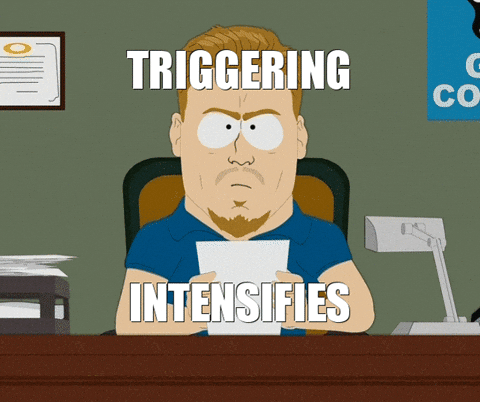This practice is not recommended anymore, yet still found in many enterprises.
Monthly password change.
Enforced high complexity.
Sticky note on screen.Monthly? That is insane. Let me guess, no mfa.
Correct!
Hey now, it’s under the keyboard. Much more secure there.
ProjectnameMonthYear!!
Are you me
Hell, I don’t even know my passwords. My password manager does. Sometimes I forget the main password but thankfully my fingers don’t, unless I start thinking about it.
How do you use your password manager to log into your PC. I mean with the AD password you’re changing monthly with “high complexity”? Cause that’s the actual problem scenario in enterprises.
If someone asks me to change some normal password, I really don’t care, just like you (cause password manager), but the main login scenario just isn’t solved with one.
Mobile device. Read and type.
This guy: 😎
Isnt this just bad practice?
deleted by creator
Ye this
Microsoft recommends against it since 2019. But apparently, it is still a thing.
This 90 days password change BS, is the worst security risk there is. Do you know how many people have Summer2024 as their work computer password because of this system? too damn many! Not to mention the problem it creates for older folks who have a hard time with the change and most times end up locking them selves out. It creates far more chaos than anything secure, which I have been explaining to my company and they still enforce it for their clients.
It’s often due to the security department following outdated standards. Nowadays NIST recommends the following:
Verifiers SHOULD NOT impose other composition rules (e.g., requiring mixtures of different character types or prohibiting consecutively repeated characters) for memorized secrets. Verifiers SHOULD NOT require memorized secrets to be changed arbitrarily (e.g., periodically). However, verifiers SHALL force a change if there is evidence of compromise of the authenticator.
Source: https://pages.nist.gov/800-63-3/sp800-63b.html
That said, the company I work for violates all of the above rules …
Summer2024 is their password? Jeez. What a idiot.
Mine is a proper set of lowercase and uppercase characters, numbers, and symbols, written in a post-it note and taped to my laptop.
Ah I just keep mine in my desk drawer next to the 2FA code fob

I am 100% adapting this scheme for my work password! Thank you!
I’ve got this email today but I have some days left, I think
Glad we are Passwordless. Now none knows me password.
Max. 16 characters
(Still remember: if they have a password length limit, they store the password in plain text!)
Lemmy-UI has a password limit of 60 characters. Does that mean they are storing your password in plain text?
He should have said a short length limit, it’s still recommended to have a length limit of some sort (I think 64 is the official recommendation) to prevent people from doing shit like pasting the entire Shrek script as a password (because you KNOW some people will lol)
No, that means they don’t like DoS attacks.
Does anyone like being on a receiving end of those?
I think they could also check that length with Javascript in the browser. Dont know, you should ask the devs.
Why would you say that? Services are able to require special characters, variable casing and numbers. Why would the reqirement of max length of the password cause the storage to succumb to plain text?
oh i didn’t know that, are companiesy finally realizing that creating and trying to remember new passwords causes more trouble then keeping one really good password?
Only on accounts that have MFA is password rotation no longer recommended.
If the account is non MFA protected password changes are still recommend.
really? what’s the standard for that? like how often should you be rotating your password?
I assumed many people forget their new passwords (because I often do) than are protected by continually rotating passwords.
It’s one of the updated NIST recommendations, I don’t recall which one but it specifically calls out no password cycling for MFA protected accounts.
I have over 500 passwords in my password manager. I don’t know what I’d do without it.
Man, so often do I get half way through my password to realise I’m now typing my old words.
I’m convinced this isn’t particularly secure because it just results in the following. Mandatory password change, password can’t be any of your last six, bla bla bla. Boom rotating stock of my last six, you happy?
“BOB-CEMU” “BOB-MERC” “BOB-SIVA” “BOB-MILK” “BOB-CERA” “BOB-DELT”
Had one company where you couldn’t use the same password for 12 months, 10 digit minimum, and had to change it every month
My very secure password series at the time.
DumbP@ss#01
DumbP@ss#02
DumbP@ss#03
Removed by mod
Password1
Password2
Password…
Password28
Password29
Edit: Call IT to reset password costing the company money because of their idiotic password policy
Password…
Password43
No joke, my father used to have to do this. I set him up with a solid pw via pw mgr and then we found out that it had to be changed every 60d. He was going to just generate a new one but I was concerned that he’d screw it up and need help resetting the pw every time, so I was like “…just had 1 to the end, and do the same in the mgr; next time 2, then 3…”.
He got to like 8 before (it appears, he stopped complaining about it) they dropped the policy. I just know that every other employee (these are not tech positions whatsoever) just resorted to “password1” and IT realized how fucking stupid that is.
Oh and it retains your last like 5 passwords, so you can’t do “password1” “password2” “password1”. Brilliant.
Never is too long. Monthly is way to short. I like the idea of doing it yearly in conjunction with other it security awareness and training campaigns.
Agreed. My last job, we were forced to change all service account passwords annually but our personal passwords every month or two.
My current job has more domains and systems so I have so many more passwords with varying complexity and age requirements. I just set a calendar event for every four weeks (one expires just under 5 weeks) and change them all to the same generated password that meets all the common requirements and I save it in my password manager.
So every four weeks, it’s seriously this hour+ long ritual for virtually no enhanced security reason.
Have you considered scripting it? For a while I worked at a place that required changing passwords every 60 days and it couldn’t have been one of your previous 24 passwords. When checking out the policy I noticed there was no minimum password age so a quick for loop later and Bob becomes your mother’s brother. Quickly cycling through 24 random passwords and back to my secure one and no more just adding the month/year.
Of course I reported it to cyber and about a year later they added a minimum age, now I’m hoping to get them to address an issue in AD that sidesteps changing passwords (though that one may be around for a while).
Unfortunately I don’t think that’s possible for my situation. Most of my passwords require logging into a portal and accepting terms of agreements.
Yeah, future me wonders why I even suggested it, I’m sure it probably violates the spirit of password change requirements.
I mean it’s a clever solution for those without password manages. Plus most of the suggestions in these comments violate the spirit of password change requirements.
Never is too long.
Why? Frequent password changes have been shown to result in weaker passwords. What’s wrong with keeping a strong one indefinitely? I mean an actual strong one not one character more than what’s current bruteforceable.
Overtime people will slip up and leak their passwords. Maybe they accidentally log in with it in the username field (causing it to get logged), leave it on a forgotten postit note, share it with a spouse, used it for a 3rd party service, wore a pattern into their keyboard, etc. None of those are that big of a deal or all that common, but added up with enough time and people and the risk accumulates. A infrequent but regular password reset helps to mitigate that risk.
Regular password resets can also help to prevent password reuse. Suppose someone uses their work password for netflix, then work requires a password change. How likely are they to manually sync the netflix password back to match the one they use for work?
Of course there are much better ways to mitigate risk. E.g. multifactor authentication. But a major security principal is defense in depth, and I think reasonably infrequent (e.g. no more than once per year) password resets have a place in that.
This goes for physical keys as well. If it is your house and you are certain no one untrustworthy has your key, then fine. But for a larger org with multiple people and turnover. Sooner or later keys will get lost, misplaced, etc. Rekeying the locks (maybe every 5 years, maybe every 25 years) has merit.
Forever is vulnerable to phishing attacks, same reason why monthly is getting discouraged. Monthly is weaker because the average person does slight variation, which attackers LOVE.
Frequent password changes don’t protect against phishing.
And while a high frequency like monthly changes will probably result in even weaker passwords, also yearly changes will make people choose weak passwords.
Gotta do mine twice a year, always needs to be new, have a number, and a special character. It was annoying because I’m a pass phrase kind of person, but found it’s not too hard to just add the year and exclamation marks for each password change into my passphrase.
Plus password managers exist so whatever.
Can’t you just have two passphrases and alternate between them ?
Nope, has to be new and unique every time. Their system keeps every password I’ve ever had, which if you think of it, is a really bad liability if they’re hacked.
For me, no. Can’t be the same or too similar to the past 4-5 passwords and has to be 14 characters long.
Oh, as a french philosopher said:
“Never has so much spirit been put into making us stupid.” -Voltaire
We have three month password expiry policy on AD accounts, but the requirements aren’t extreme. We’d do away with it, but then we have our own CEO writing their password down on a piece of paper and giving it to us to troubleshoot their laptop (we have admin accounts for a reason ffs), after being repeatedly told not to, forcing employees to rotate their passwords suddenly doesn’t sound too crazy. People are just way too irresponsible sometimes. Plus, we need to have it for certifications, so there’s that.
Which certifications? NIST standards don’t recommend regular rotations anymore.
Nist guidelines used to recommend rotation, and our security team would quickly point to it when people complained.
So of course we jumped on that and security team said “well nist are just guidelines and we go for more stringent requirements”…
The CEO at my last place used to forget his passwords at least once a week, would write them on Post-It notes on his desk (and lose them by day’s end).
We had a dashboard that showed failed security and he was many, many times worse than the rest of the business combined. That man cost the business more in IT time than anyone.
This was a bank. Granted, a small lending-only bank but still, I would never get a mortgage or loan with these people.
They should have just put a Yubikey on his keys. He never lost those.
It’s somehow always the guys in management/on top. On the first sign of inconvenience, they start complaining about all the security measures, because now it affects them personally, and they’re not here to be managed! Security is for everyone else, but definitely not them. They’re above it.
It’s even better when the company saves your old passwords, just so you can’t use them again.
Just add a number suffix and increment it each time. This doesn’t exactly make your password any stronger but that’s not what they’re asking for with their stupid policy.
My company tracks the first and last character so you can’t do that. Personally I change a single character in the middle of my password to work around this.
Same. Its so stupid. Doesn’t increase security and just annoys everyone.
Error: Your password’s Levenshtein distance indicates that your new password is more than 20% similar to a password previously used within the last 10 years.
Policy requires your password to:
- Be unique
- Have at least one uppercase letter
- Have at least one lowercase letter
- Contain 2 symbols other than apostrophe
- Have 4 numbers that are either separated by other characters, or represent an integer both greater than 3000 and not ending with the same last two digits as the previous or next 17 years from the current date.
- Include exactly one Cryllic character
- Exceed no more than 18 characters
/satire (I hope)














